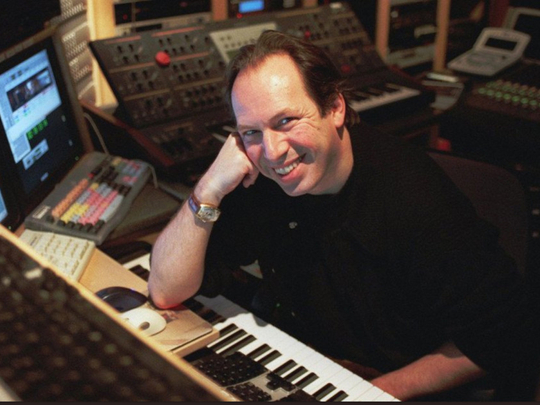
The Christopher Nolan film Dunkirk, about the dramatic rescue of Allied troops from a French beach in the Second World War, ignores many conventions of war movies — most prominently, a heroic score. Instead of sweeping strings and get-out-the-cavalry horns, Dunkirk is set to a droning beat that ratchets ever up in intensity.
“The fundamental mystery was, how do you make something consistently give you the sense of tension rising?” said Hans Zimmer, the composer and Nolan’s longtime collaborator. They started with the script, which Nolan — who takes cello lessons “as a form of relaxation,” he said — wrote with a musical mindset. He knew the illusory technique called the Shepard Tone, “whereby you feel a continuing rise in pitch,” he said, though the music doesn’t actually escalate that high. “What I wanted to do was produce the structural equivalent of that for the screenplay.”
He sent the script to Zimmer, along with a recording of a particularly insistent windup pocket watch he had. Zimmer had the ticking turned into a synthesizer sound: Their mystery had a pulse.
Another stroke of inspiration came when Nolan suggested using Elgar’s Nimrod from the 1898-99 Enigma Variations. as part of the theme. Nolan explained: “I didn’t really say this to Hans, but it played at my father’s funeral a few years ago. I just find it unbearably moving.”
In a three-way phone interview, Zimmer and his collaborators, Benjamin Wallfisch and Lorne Balfe, described the process of creating what Zimmer called “the most intimate” work he’d ever made with Nolan. He was speaking from New York, where he was due onstage for his concert tour, and Balfe and Wallfisch from Los Angeles. Nolan spoke separately, from Vietnam, where he was taking a brief break from promotional duties. These are edited excerpts from the conversations.
Did you want the tension in the music to ever resolve?
Hans Zimmer: No. I have to believe that the tension will be unbearable and the outcome will be tragic, and in a way I have to pretend they will never get off the beach. If there are Method actors, I suppose I’m a Method composer. I went to the beach [at Dunkirk]. This sounds insane, but I was in the neighbourhood, and I went knowing they were shooting there on the greyest, most foul day. I picked up a handful of sand and put it in a jar and took it with me. There was something good about having that next to me. And just generally when I start on a movie, the agonising deadline, the unsolvable things, I’m tense most of the time.
Did you have other reference points?
Zimmer: It was very important to forget any other war movie I’d ever seen. This movie is more about time than any other movie we’ve ever done, about time running out.
Loren Balfe: I never thought of it as a war movie. I always thought of it as a thriller.
Christopher Nolan: I asked Hans not to write any emotional music. What I said to him was I wanted objectivity — the way I wanted to make the film was, it’s all about suspense and tension and not at all about emotion. (The music cues he sent during shooting) were not emotional cues, they were very much about pacing. We could (use them via an iPad) when we were thinking about what the rhythms of the shots would be. This entire film was really very much about rhythm.
Did you use any unusual instrumentation?
Zimmer: There’s a double bass that’s played in the extremes, high register. I try to keep a small group of musicians playing always at the extremes of capabilities.
Benjamin Wallfisch: We had 14 cellos who were always uncomfortable, always playing too high.
Zimmer: I was really trying to be in sync with what Richard King was doing with sound effects. Richard would send over the sound of Moonstone, the boat, and then it would become a musical instrument.
Balfe: That’s something you’re not necessarily aware of — the sound effects of boats and motors were in same tempo as the music.
Nolan: Of any of the films I’ve done, this had the tightest fusion between music, picture and sound effects, which made editing very difficult. There were many parts of this process where (Hans) and his guys were cursing us in the studio.
Zimmer: I know what Richard’s going to come up with, and I better be on my A game, because otherwise I’m going to sound like a couple of hamsters running around in a shoebox. There’s no way I’m going to beat the sound of gunfire or crashing waves, so I have to approach it from a different point of view. Most of the music, I actually asked the players to play quietly, but with great intensity.
You’re all British, or have lived there. Can you explain the significance of Elgar’s Nimrod?
Zimmer: It’s part of English culture, since it was written. It’s quite the opposite to the national anthem — it’s more the emotional anthem to a nation.
Wallfisch: There’s a sort of nobility about it, which I think British people aspire to.
Zimmer: It’s a quiet nobility — it doesn’t show off, it’s not heroic.
Wallfisch: [We thought] how can we strip it all away and not be sentimental? We added occasional bass notes that didn’t exist in the original. And we slowed it down to 6bpm [beats per minute].
Zimmer: By making the notes so long, the bow isn’t long enough to play (them). The way around it is to let each player independently play the note — come in, come out. It gives it a beautiful text, like looking across that beach and you pick out the individual amid the mass of faces.
Wallfisch: In the recording we kept pushing on that idea: We’re not an orchestra, we’re just individuals.
Zimmer: Usually in a piece of music, you don’t ever expose the player playing one note. Most pieces of music are rushing from one chord to the next. But there’s something very interesting about giving the listener a moment.
Nolan: Quite often you’re asking music to do something that you weren’t able to do with the picture or dialogue. Hans didn’t use that crutch. There’s only emotion in the music when you just can’t not have it. The tension doesn’t feel resolved — in a way you want it to be replaced with some kind of earned emotion. And that’s where the Elgar theme came in. There’s a moment at the end where the music goes back to the most basic form of the ticking, and then it just stops. And there’s something about that that I found very energising.
Zimmer: Can I say something rude? This score is Chris Nolan’s score. This movie is one man’s vision. It doesn’t matter if it was Elgar, or Hans Zimmer, or Ben Wallfisch — there was not a moment where I would move my hand where I wouldn’t feel Chris’ hand on my hand, reaching for the notes. This was the closest collaboration that I ever had with a director where even though he would never ever play a note, he somehow played every note that was in that score.
Balfe: Every sound effect and every note, he’s directing it.
Don’t miss it
Dunkirk is currently showing across the UAE.













